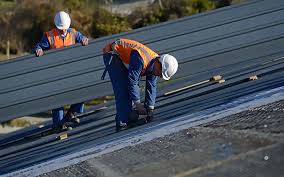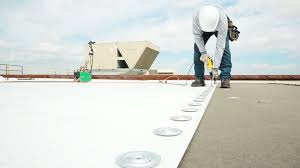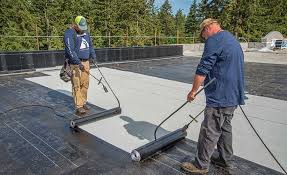What does a commercial roofer do?
A roofer repairs, replaces, and installs roofs on residential homes or commercial buildings. They use a variety of materials such a metal, aluminum, wood, shingles, tiles, slate, and steel. Roofers scale the tops of a property to repair leaky roofs, replace broken tiles, or seal areas to make them watertight. Roofing is physically demanding and requires the stamina to stand, climb, and carefully walk in hot, cold, windy, snowy, or rainy weather. The work that roofers do ensures that buildings are structurally sound and safe for those who enter. Roofers can work on a full- or part-time basis, and many receive weekly salary payments.

What does a commercial roofer do?
Here are the duties and responsibilities that a Commercial Roofer is likely to perform in their role.
- Construct and assemble layers of roofing from insulation to TPO membrane or EPDM roofing.
- Train in TPO heat welding.
- Install full TPO type roofing from start to finish.
- Maintain proper safety codes and procedures to keep up with OSHA regulations.
- Perform installation and repair of PVC and vinyl type flat roofs of commercial buildings ..
- Tear off and installation of commercial roofing systems (EPDM or rubber roofing mostly )
- Work as part of a team in order to make sure that all work are done according to OSHA standards.
- Assist with fabrication of HVAC duct ways.

Benefits of Using Commercial Roofing Contractors
If you want to learn more about the benefits of hiring a commercial roofing contractor, keep reading.
1. Following Your City’s Building Code
Are you familiar with the building code in your city?
The building code is a set of laws and regulations that govern how construction projects get handled. If you are not familiar with the system and proceed to construct your new roof by yourself, you may make a few mistakes.
If an inspection of the structure indicates that the building code got violated, you may have to demolish the roof. This means you incur a loss for the first roof and also the additional cost to do it again.
Commercial roofers make it a point to stay updated on the building code. Thus, they are your best bet to get a large commercial roofing project done correctly.
2. Your Safety
Roofing is a dangerous endeavor for a novice, and there have been numerous cases where DIYers have fallen off roofs trying to conduct installation or repairs.
Now, you might be asking, “Aren’t there pieces of safety equipment I can buy to prevent that?”
The short answer: yes. But, unless you’re a full-time roofer, then you’re going to make these costly purchases for a one-time job. Isn’t it better to have a professional roofing contractor handle the roofing work for you?
Hiring a professional will save you not only time but also money and potential accidents in the process.
3. The Quality of Work
Quality work comes with hands-on experience. You could watch every roofing DIY video on YouTube, but your quality of work will not match a professional’s unless you’ve been putting in the real world experience.
Roofing involves more than just attaching roofing materials to roofing beams. You have to consider numerous factors, including the installation of ventilation outlets wherever necessary. Without adequate experience, you are bound to make either a minor or major mistake.
A minor mistake (like a leaky roof) could lead to more severe consequences when mold develops, leading you to spend even more time and money on a project that could have been fully completed if a commercial roofing contractor was hired.
4. Staying Within Budget
A common issue with DIY roofing is going over budget. This happens when a homeowner commences a roofing project without adequate planning and budgeting.
Budgeting involves calculating the costs of the materials as well as accounting for miscellaneous expenses that might occur. It is for this reason that roofing contractors provide estimates and quotes before they commence working on your roof.
Hence, with a commercial roof contractor, you are fully aware of all the costs involved. You do not get any unexpected charges, allowing you to stick to your budget.
5. Advice on the Best Materials
When it comes to roofing, there are many different types of materials that you can choose from for your building. And because of this, it can be difficult to determine which products are best for your application.
Quality Roofing is a matter of selecting the materials that are favorable to the weather patterns in your city and have the longest lifespan with the least maintenance.
It’s best to work with a commercial roofing contractor who has worked with numerous materials from various manufacturers. These contractors will actually have experience and know which materials are going to be best for your roof.

Things to consider in a commercial roof
Keep the following factors in mind when selecting or specifying a low slope roof:
- Choose the highest possible quality materials from an established manufacturer with an excellent reputation for integrity. CertainTeed has been manufacturing roofing materials for over 100 years.
- Compare similar products. Evaluate the technical data provided by the manufacturer. Compare the weights, thicknesses and ASTM test results.
- Remember, the money saved today on a low cost roofing system can be more than offset by the need to reroof sooner as the result of poor performance leading to leakage or premature failure.
- Consider the commercial roofing manufacturer’s warranty. The length of the warranty term (in years) helps gauge the superiority of the system selected. Generally, the longer the warranty, the better the system. Is a guarantee which covers not only the material but also the contractor’s workmanship available for the roof system selected?
- Property value. Is the manufacturer’s warranty transferable to a new building owner?
- How committed is the commercial roofing material manufacturer willing to be? Does the manufacturer, as an option to the owner, have an approved contractor program in place? If an enhanced warranty that includes workmanship is selected, will the manufacturer inspect the roof project? With CertainTeed, the answer to all of these questions is yes.
Types Of Commercial Roofing
Spray Polyurethane Foam Roofing
Spray Polyurethane Foam (SPF) is an eco-friendly roofing option for commercial, industrial and manufacturing facilities. Spray Polyurethane Foam, more commonly referred to as SPF, is a material that is sprayed as a liquid so it can expand into a foam, creating a solid layer across an existing roof.
While SPF roofing is not the most known type of roofing material, the technology has been around since the early 1960s for industrial, commercial, and residential facilities. An SPF roofing system can be used in any climate, and when correctly installed and maintained, can last over 50 years.
Single-Ply Membrane Roofing
Single-Ply Membrane is a time-tested roofing option for commercial, industrial and manufacturing facilities. Single-Ply Membranes are sheets of rubber and other synthetics that can be ballasted, mechanically fastened or chemically adhered to insulation creating a layer of protection on your commercial facility.
While Single-Ply Membrane Roofing is one of the most well-known types of commercial roofing material, there are several types to fit your budget and facility needs.
Metal Roofing
Metal Roofing is one of the oldest commercial roofing systems on the market. Most metal roofing systems use corrugated galvanized steel, although other materials such as aluminum or tin can also be used.
Since metal roofing material is rather light in weight, it can be installed right on top of the existing roof. After a metal roofing system is installed, a coating can be added for waterproofing, rust protection, and UV protection.
Shingle Roofing
Commercial Roofing on ChurchShingle roofing is mostly known for homes and residential roofing, but shingles are very often used for steep slope commercial roofing applications. Shingles can be made out of a few different materials, including wood, slate, metal, plastic, ceramic and composite material such as asphalt. There are two main types of shingles: Asphalt and Architectural.
Asphalt Shingles: most common, cost-effective shingle on the market used for applications. These roof systems often come with 15 – 30-year warranties on average.
Architectural Shingles: multi-layered and heavier to add durability and weatherproofing to the building. Often comes with “lifetime” warranties
Built-Up Roofing
Built-Up Roofing Systems have been in use in the U.S. for over 100 years. These roof systems are commonly referred to as “tar and gravel” roofs. Built-up systems are installed by alternating layers of asphalt or tar and supporting fabrics directly onto the roof. You can choose the number of layers (or plies) that are installed. The final layer of a built-up roofing system consists of stone or gravel.